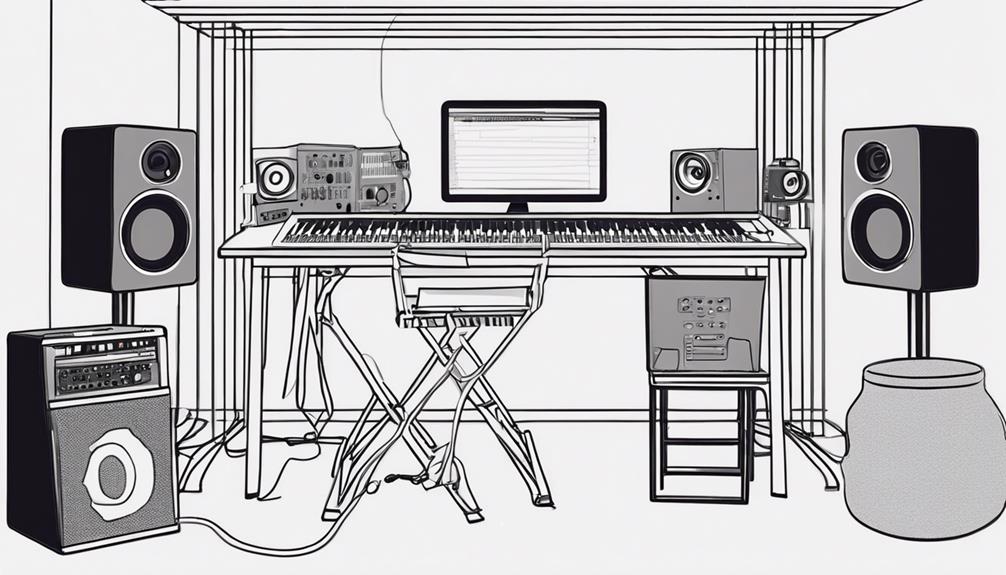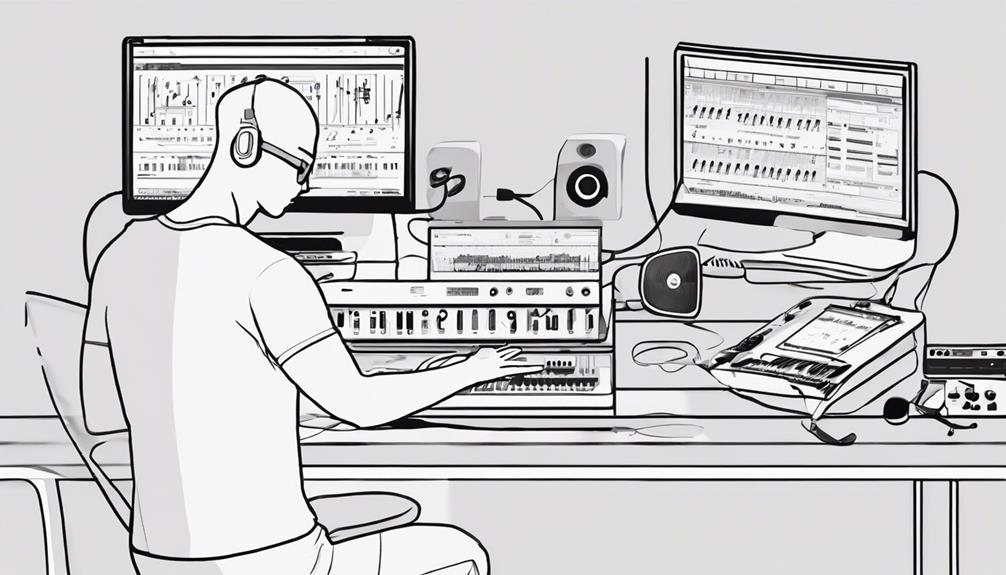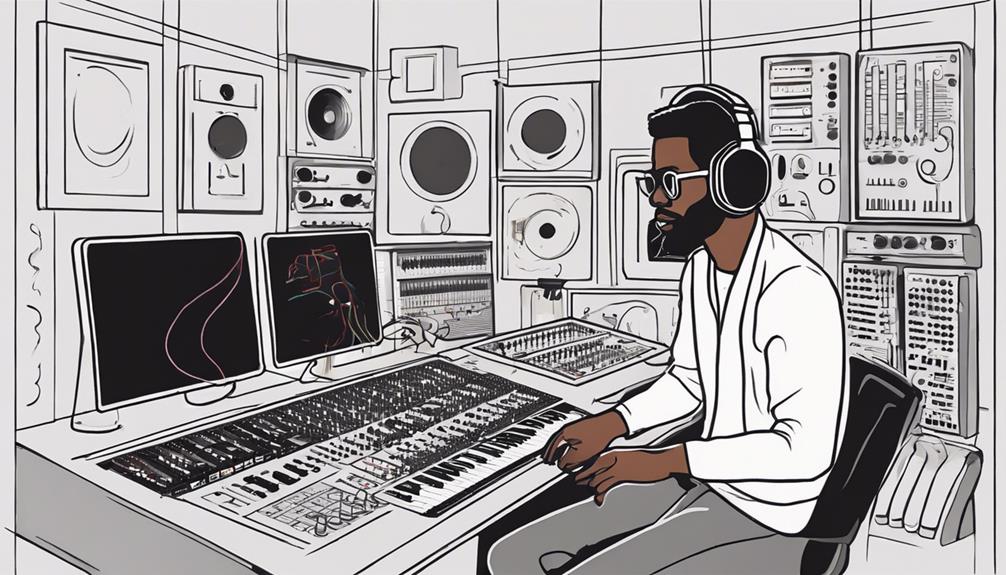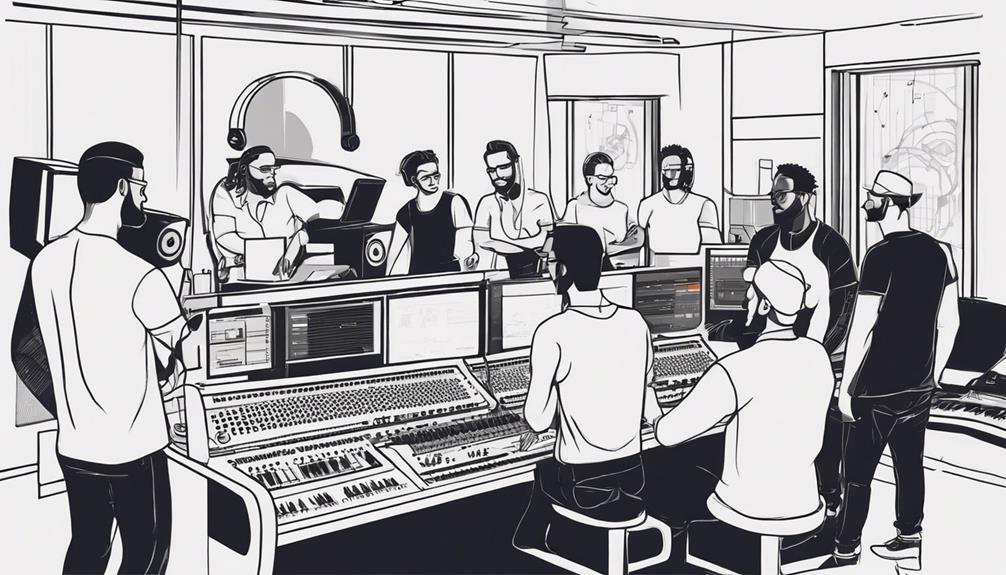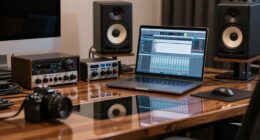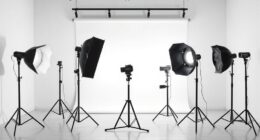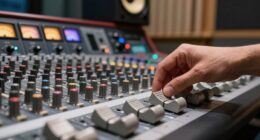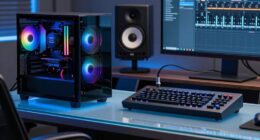Turn your dream of owning a music production studio into reality by setting clear goals and creating a budget tailored to your needs. Choose the right studio setup level based on your ambitions. Acquire essential equipment like a computer, audio interface, and studio monitors to kickstart your journey. Invest in a MIDI keyboard for enhanced creativity and control. Explore different synthesizer options that suit your sound preferences. Don't forget quality audio cables and USB connectors for efficient connectivity. Consider enrolling in music production courses to gain skills and credibility. Take these steps to begin your music production studio journey!
Key Takeaways
- Set a realistic budget tailored to needs and ambitions.
- Choose a studio setup level based on production requirements.
- Acquire essential equipment like MIDI keyboards and synthesizers.
- Invest in quality audio cables and USB connectors for seamless connections.
- Consider enrolling in music production courses for structured learning and career opportunities.
Define Goals and Budget
To start your music production studio successfully, define your goals and set a realistic budget tailored to your specific needs and ambitions. If you aim to create electronic music, focus on acquiring equipment suitable for recording and producing electronic sounds. When outlining your budget, consider the costs of essential gear such as audio interfaces, MIDI controllers, and synthesizers important for electronic music production.
Recording is a fundamental aspect of music production, so allocate a portion of your budget towards high-quality microphones, studio monitors, and headphones to guarantee accurate sound capture and mixing. Factor in expenses for acoustic treatment to optimize your recording space and minimize unwanted noise interference.
When setting your budget, research the prices of equipment and accessories needed for recording and producing electronic music. Prioritize your investments based on quality essentials that align with your budget, enhancing your music production capabilities while staying within financial constraints.
Choose Studio Setup Level
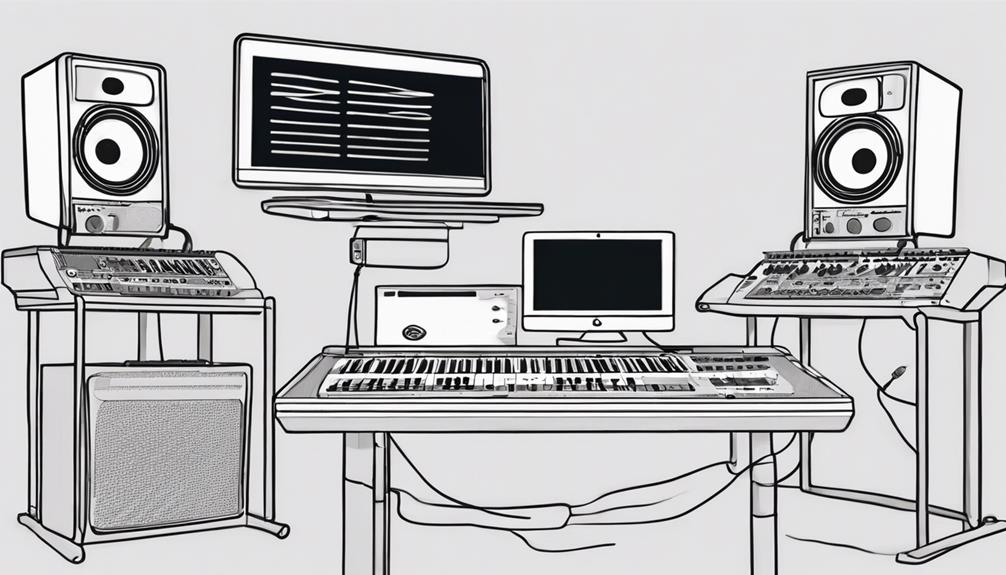
As you consider your studio setup level, keep in mind the basic equipment needs, advanced tech options, and budget considerations associated with each category.
Understanding these points will guide you in selecting the right gear and resources to match your music production ambitions.
Whether you're a beginner dreaming of a studio or an experienced producer aiming for professional quality, your setup level choice will shape your music production journey.
Basic Equipment Needs
When determining your basic equipment needs for starting a music production studio, it's important to identify your studio setup level: Dreamer, Audio File, Musician, or Producer.
At the Dreamer level, you'll need a computer, headphones, and a DAW to get started on your music production journey.
For those aiming at the Audio File level, incorporating a MIDI keyboard and studio monitors can enhance your music production experience greatly.
Moving up to the Musician level, consider adding a synthesizer and an audio interface to broaden your sound creation and recording capabilities.
Finally, at the Producer level, think big ones – hardware controllers, outboard gear, and a treated room are pretty much essential for professional music production and mixing.
It's important to assess your goals and expertise level to determine the right equipment for your studio setup.
Advanced Tech Options
Considering your chosen studio setup level, exploring advanced tech options can greatly elevate your music production capabilities and overall studio experience. Depending on whether you align more with the Dreamer, Audio File, Musician, or Producer setup, there's one thing that remains consistent: the opportunity to enhance your studio with advanced technology.
For the Dreamer, a simple setup with a computer and headphones might suffice, but Audio Files might prioritize high-quality audio interfaces, microphones, and studio monitors for accurate sound reproduction.
Musicians may find MIDI controllers, synthesizers, and drum machines beneficial for boosting creativity, while Producers often invest in high-end gear like studio monitors, outboard gear, hardware synthesizers, analog equipment, and professional mixing consoles to achieve top-tier studio quality.
Budget Considerations
To establish your music production studio effectively, start by determining your budget to select the appropriate studio setup level: The Dreamer, The Audio File, The Musician, or The Producer.
If you're a beginner looking for a budget-friendly option, consider The Dreamer level, which includes essential equipment like a computer, DAW software, and headphones.
For a mid-range setup with improved sound quality, The Audio File level offers quality studio monitors, a MIDI keyboard, and an audio interface.
Stepping up to The Musician level provides more advanced capabilities with a MIDI controller, synthesizer, and dynamic microphone.
Finally, for serious music production projects, The Producer level, the highest budget tier, includes professional-grade gear such as a MIDI drum pad, analog synthesizers, and high-end studio monitors.
Choose the studio setup level that aligns best with your budget and production needs to kickstart your music production journey effectively.
Acquire Essential Equipment
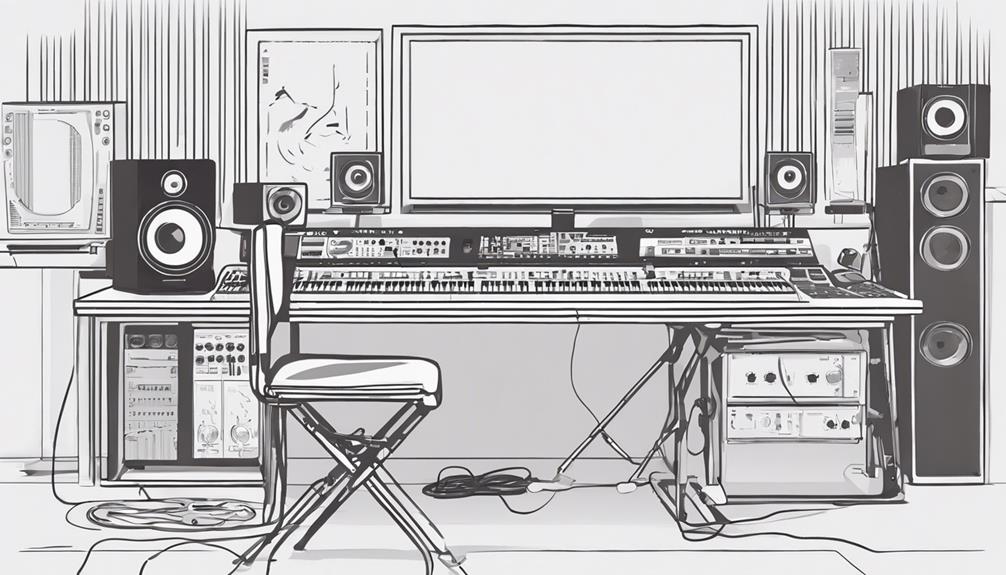
When setting up your music production studio, you'll need to carefully consider the equipment you acquire. Tips on selecting the right gear, balancing quality and cost, and finding budget-friendly options are essential factors to weigh.
Making informed choices about your studio equipment will guarantee you have everything you need to kickstart your music production journey.
Equipment Selection Tips
Acquire the essential equipment necessary to start your music production studio, including a computer, audio interface, studio monitors, and headphones. These tools form the backbone of your studio setup, allowing you to record, mix, and master your music.
Enhance your capabilities by investing in a quality microphone, MIDI keyboard, and audio cables. These additions provide versatility and improved sound quality for your productions.
To expand your creative options, consider adding a synthesizer and MIDI controller to your setup. A comfortable chair is often overlooked but essential for extended studio sessions, ensuring you can focus on your work without discomfort.
Select a DAW software that aligns with your production style and workflow, enabling you to bring your musical ideas to life efficiently.
Budget-Friendly Options
Explore cost-effective alternatives when obtaining essential equipment for your music production studio to stay within your budget while still meeting your needs.
To kickstart your studio without overspending, here are some budget-friendly options to explore:
- Look for Second-Hand Gear: Purchasing pre-owned equipment can be a great way to save money while still getting quality gear.
- Explore Beginner-Friendly Bundles: Opting for starter kits or bundles designed for new producers can be a cost-effective way to acquire essential equipment.
- Utilize Online Marketplaces: Websites like eBay or Reverb, as well as online forums, can be treasure troves for finding used equipment at lower prices.
- Compare Prices and Features: Research different brands and models, read reviews, and compare prices to make informed decisions on the best cost-effective purchases for your studio setup.
Quality Vs. Cost Tradeoff
To ensure you strike the right balance between quality and cost in acquiring essential equipment for your music production studio, it's crucial to make informed decisions based on your specific needs and budget constraints.
When starting out, prioritize fundamental items like a reliable computer, quality DAW software, an audio interface, studio monitors, and headphones over unnecessary extras.
Remember, quality doesn't always mean high prices; research and compare different brands to find the best value. Investing in equipment that enhances your workflow and improves production quality is key, even if it requires a slightly higher initial investment.
You can also consider buying used or refurbished gear from reputable sources to save money without compromising on quality. Focus on key items that will have the most significant impact on your studio setup and music production process, ensuring you get the best of both quality and cost-effectiveness.
Invest in MIDI Keyboards
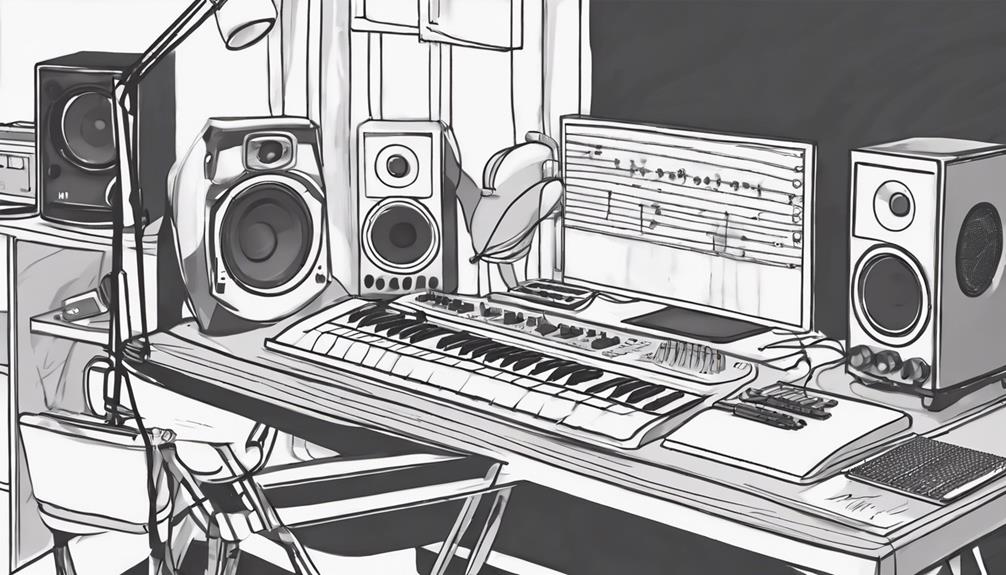
When setting up your music production studio, one key investment to prioritize is a MIDI keyboard. These versatile tools are indispensable for translating your musical ideas into your digital audio workstation (DAW) effectively.
Here's why investing in a MIDI keyboard is essential:
- Dual Functionality: Many MIDI keyboards also function as synthesizers, enabling you to create sounds directly from the keyboard itself, expanding your creative possibilities.
- Ease of Connectivity: Modern MIDI keyboards often connect via USB, making setup a breeze and reducing the clutter of additional cables in your studio space.
- Enhanced Control: MIDI keyboards equipped with drum pads and assignable controls offer a wide range of options for manipulating sounds and enhancing your music production process.
- Workflow Optimization: Selecting a MIDI keyboard with the right number of keys and features tailored to your needs can greatly streamline your music production workflow, boosting efficiency and creativity.
Investing in a quality MIDI keyboard tailored to your requirements can elevate your music production experience and help you realize your artistic vision more seamlessly.
Explore Synthesizer Options
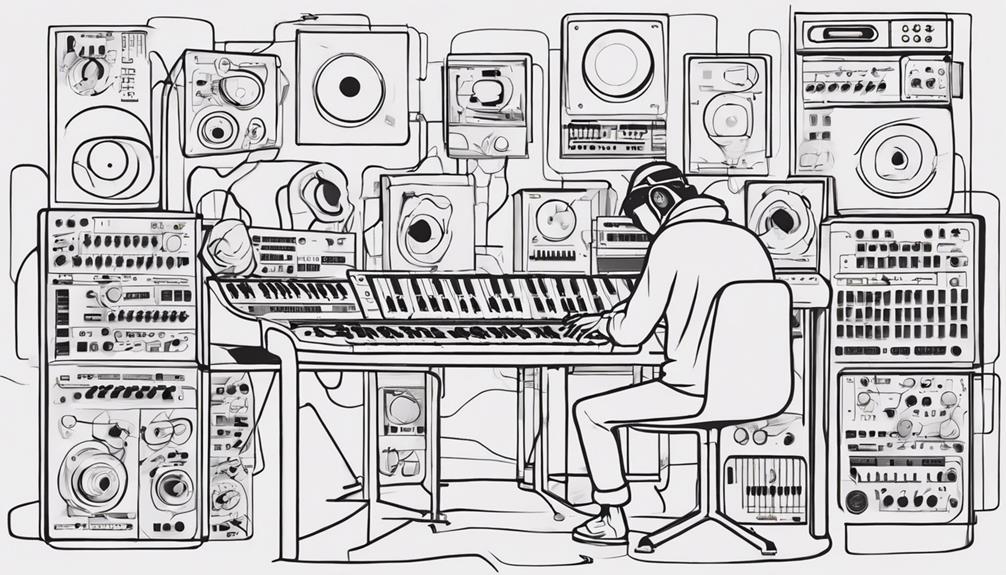
Explore various synthesizer options to enhance your music production studio setup. Synthesizers, whether hardware or software, play an important role in shaping the sounds of your music. Hardware synthesizers like Moog, Korg, Roland, and Dave Smith Instruments offer unique analog sounds and hands-on control, perfect for those seeking a tactile experience. On the other hand, software synthesizers such as Serum, Massive, and Sylenth1 provide a vast array of sound design possibilities and presets, offering flexibility and affordability.
When choosing between hardware and software synthesizers, consider factors like your budget, sound preferences, and workflow. Below is a comparison table to help you weigh the pros and cons of each option:
| Aspect | Hardware Synthesizers | Software Synthesizers |
|---|---|---|
| Control | Tactile knobs and sliders for hands-on manipulation | Virtual interfaces controlled via mouse and keyboard |
| Sound Quality | Unique analog sound characteristics | Diverse sound design possibilities |
| Cost | Generally more expensive upfront | Affordable and often offer free trials |
Make an informed choice based on your specific needs and preferences to elevate your music production capabilities.
Get Quality Audio Cables
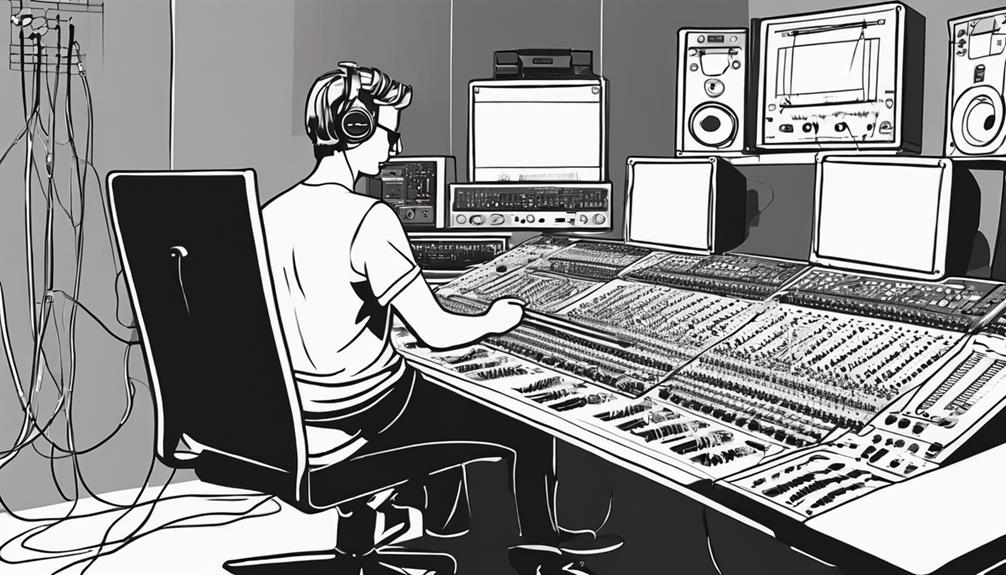
Invest in high-quality audio cables to guarantee peak sound performance in your music production studio. Quality cables are essential for maintaining the integrity of your audio signals and ensuring that your music sounds as intended.
When selecting audio cables for your studio, here are some key considerations to keep in mind:
- High-Quality Connectors: Opt for cables with excellent connectors to establish secure connections and minimize the risk of signal loss.
- Effective Shielding: Look for cables with proper shielding to guard against interference and external noise, preserving the clarity of your audio.
- Balanced Cables: Utilize balanced cables for longer runs to reduce noise and maintain the quality of your audio over extended distances.
- Appropriate Length: Choose cables of the right length to connect your equipment without creating a tangled mess or compromising signal strength.
Ensuring your cables are neatly labeled and organized will further streamline troubleshooting and maintenance tasks in your studio setup. By investing in high-quality audio cables, you set a strong foundation for producing professional-grade music.
Purchase USB Connectors
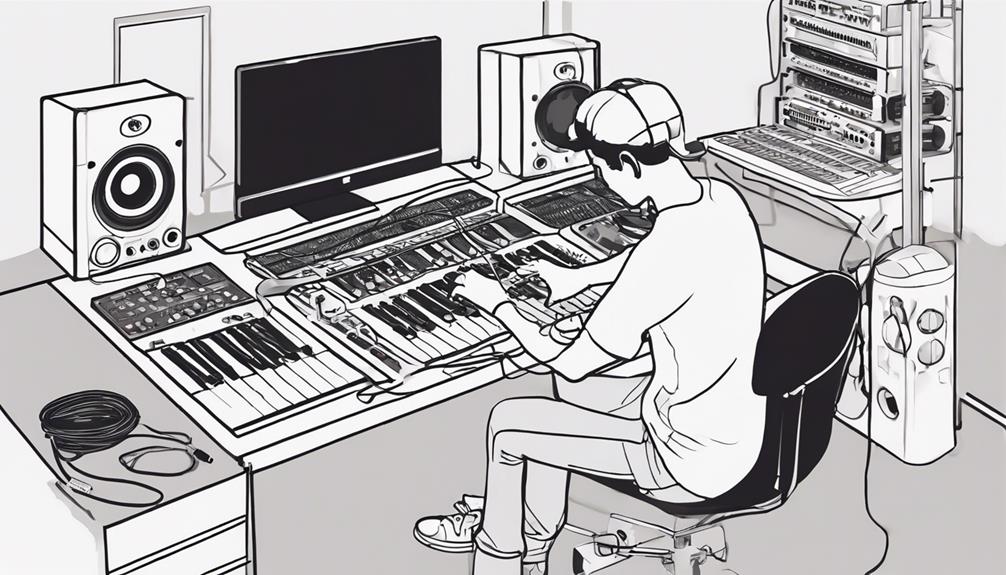
Consider stocking up on a variety of high-quality USB connectors to facilitate seamless connections between your modern MIDI keyboards and other devices in your music production studio.
USB connectors play an important role in transmitting MIDI data and audio signals quickly and reliably. Their widespread use in music production studios is due to their versatility and user-friendly nature.
To guarantee a smooth workflow, having a diverse selection of USB cables to accommodate the various devices in your studio setup is vital.
Investing in high-quality USB connectors is paramount to maintaining a stable connection and preventing signal loss during your music production sessions. Opting for reliable connectors can make a significant difference in the quality of your recordings and overall studio experience.
By having a range of USB cables on hand, you can easily connect your MIDI keyboards, audio interfaces, controllers, and other equipment to your computer without any hassle.
Prioritizing the purchase of high-quality USB connectors will contribute to the efficiency and effectiveness of your music production endeavors.
Enroll in Music Production Courses
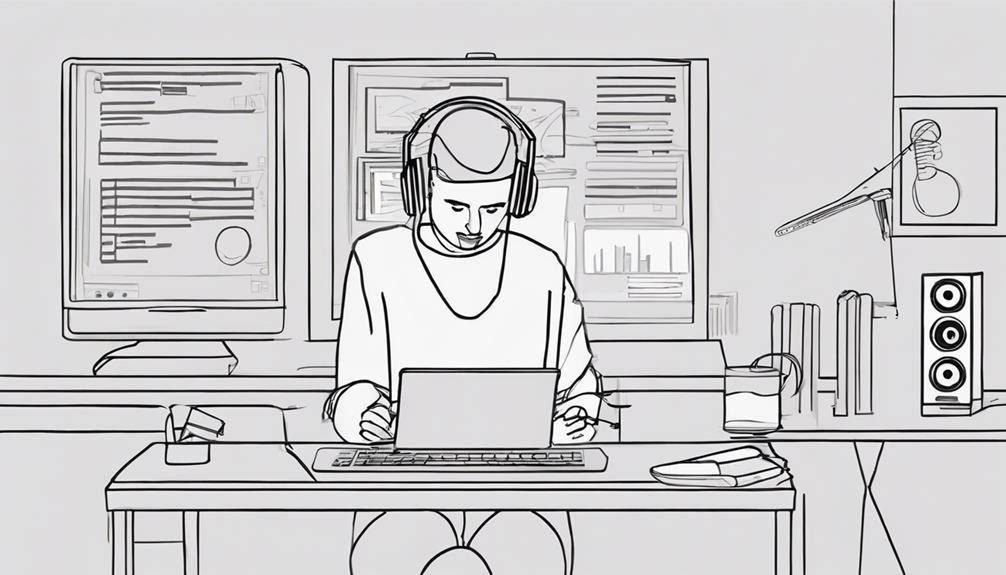
Enroll in music production courses to gain structured learning from beginner to advanced levels, covering essential topics like music theory, sound design, mixing, and mastering. These courses provide a solid foundation and advanced techniques to hone your skills and creativity in music production.
Here are four key benefits of enrolling in music production courses:
- Structured Learning: Courses offer a step-by-step curriculum that guides you through the fundamentals and progressively advances to more complex topics.
- Practical Application: Interactive lessons enable you to apply theoretical concepts directly to your music projects, enhancing your hands-on experience.
- Networking Opportunities: Joining a course community allows you to connect with like-minded individuals, aspiring producers, and industry professionals, fostering valuable relationships.
- Certifications and Career Opportunities: Completing courses can lead to certifications, boosting your credibility and opening doors to various career paths in the music production industry.
Join Community Platforms
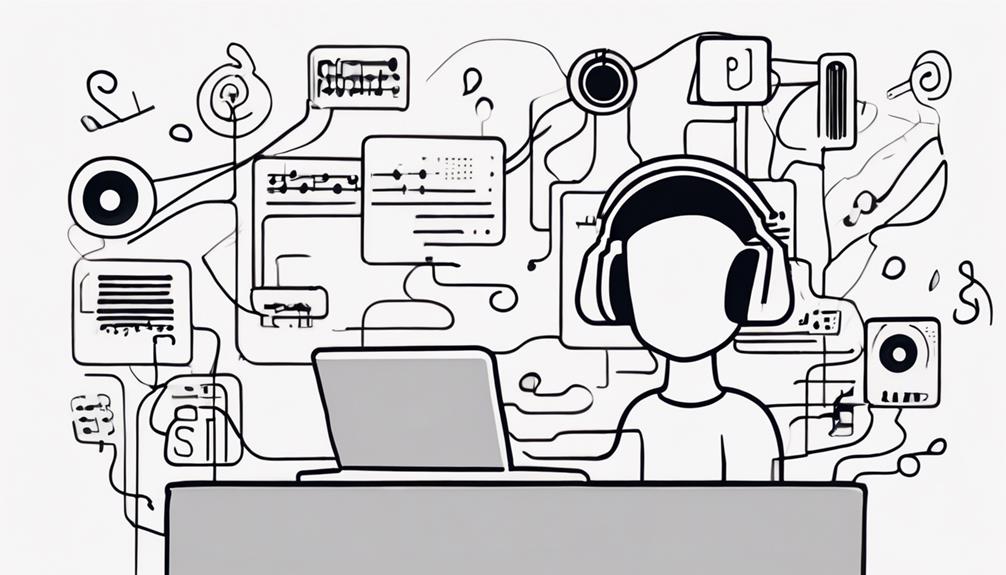
To expand your network and enhance your skills in music production, engage with various community platforms such as forums, Discord servers, and social media groups. These platforms offer valuable opportunities to connect with like-minded individuals, share your work, receive feedback, and collaborate with other producers.
By actively participating in discussions, you can stay informed about industry trends, discover new techniques, and learn about software updates that can elevate your music production game.
Moreover, community platforms serve as a goldmine for valuable resources, tutorials, and advice from experienced producers. This wealth of information can help you optimize your studio setup, refine your production techniques, and ultimately improve the quality of your music.
Building a supportive network of fellow producers through these platforms is also paramount. Surrounding yourself with individuals who can provide encouragement, motivation, and guidance will be instrumental as you navigate the challenges and triumphs of your music production journey.
Frequently Asked Questions
How to Start a Music Production Studio?
To start a music production studio, determine your budget, research essential equipment, create a dedicated workspace with acoustic treatment, learn production software, and network with other producers. Collaborate, grow, and make your dream a reality. Additionally, spend time honing your craft by experimenting with different genres and techniques to find your unique sound. Seek out online tutorials, workshops, or courses that can guide you on how to start music production effectively and maximize your creative potential. Remember, consistency and passion are key to building a successful music production career.
How to Start a Music Producer Career?
To start a music producer career, research essential equipment, learn skills through online resources, collaborate with others, and build an online presence. Stay updated on industry trends. It's crucial to invest time and effort into your passion.
How Profitable Is Owning a Recording Studio?
Owning a recording studio can be profitable if you strategically market services, diversify income streams, and invest in quality equipment. Building a strong reputation and understanding industry trends are key to maximizing financial success.
How Much Money Can You Make With a Recording Studio?
You can make anywhere from $30,000 to over $100,000 per year with a recording studio. Building a strong reputation, networking, and offering quality services are essential. Diversifying with music lessons, podcast recording, or sound design can boost earnings.
Conclusion
Now that you've set your goals and budget, chosen your studio setup, and acquired all the essential equipment, it's time to immerse yourself in the world of music production!
With MIDI keyboards, synthesizers, audio cables, USB connectors, and a bit of knowledge from music production courses, you're on your way to turning your dream into reality.
Don't forget to connect with fellow music producers on community platforms for support and inspiration. Let the music-making begin!

